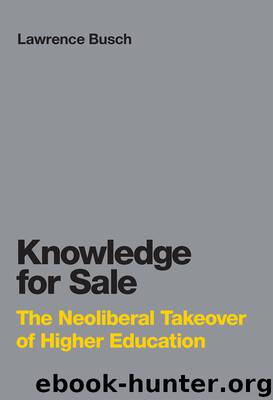The Knowledge for Sale by Lawrence Busch

Author:Lawrence Busch
Language: eng
Format: epub
Tags: US; America; UK; university; college; neoliberalism; research; institution
Publisher: The MIT Press
Published: 2017-03-30T16:00:00+00:00
Checking prestige of journals. In addition to counting articles and citations, some administrators have begun to use the rankings of the various journals in a given field as a means of evaluating researchers. This is often accomplished by using the Journal Impact Factor (JIF) developed by the Web of Science. Similar approaches are used to evaluate book publishers. Of course, as noted above, this measure was not developed for evaluation of individual faculty members (Nature 2010) or even individual journals. Despite that, use of this approach means that an article appearing in Science would receive a higher ranking than one published in a less prestigious journal. Similarly, publishing an article in a top journal in a given field would be weighted more than an article in a regional journal.
Furthermore, some nations now offer bonuses to scholars who publish in these journals. Pakistani researchers can receive a bonus between $1,000 and $20,000 based on the JIF of the journal in which they publish. Several Chinese research institutes offer bonuses along similar lines (Archambault and Larivière 2009). That, combined with the global pressure to publish in the most prestigious journals, has increased the submission rates for those journals. From 2000 to 2009, Science reported a 22% increase in submissions, although the number of papers published did not increase (Franzoni, Scellato, and Stephan 2011). The end result is that both the most prestigious journals and the scholars they use as reviewers now have a much heavier burden of review than they once did. This takes time and resources away from other more productive activities.
In addition, for all practical purposes, the various incentives to scholars to publish in prestigious “international” journals put a premium on English-language journals. One need only look at the lists produced by AERES (2013). Quite obviously, this creates a considerable advantage for scholars who write English well over those who do not, independently of the quality of their work. But the focus on English and on the particular writing style of English-language scholarly journals has an even more insidious effect, especially on scholars in the social sciences and humanities. Because much research in these fields tends to address local or regional issues for whom the audience is not English speaking, it is almost by definition excluded from publication in “international” journals. Thus, pressure to publish in international journals is tantamount to ignoring issues of local or regional importance. For example, Hanafi (2011, 300) notes, “[t]he 2008 annual report of the Faculty of Arts and Sciences at AUB [American University of Beirut] demonstrates clearly how few social science publications are published in Arabic (only three of 245 articles and two out of 27 books).”
Here, too, other problems arise. In particular, highly prestigious journals tend to have low acceptance rates. Hence, reviewers and editors are likely to be far more orthodox in deciding what to publish. Some years ago, George Akerlof (1970) attempted to publish a paper in the American Economic Review that defied contemporary economic thought. Akerlof finally published it in the less prestigious Quarterly Journal of Economics (Cassidy 2009).
Download
This site does not store any files on its server. We only index and link to content provided by other sites. Please contact the content providers to delete copyright contents if any and email us, we'll remove relevant links or contents immediately.
Rich Dad Poor Dad by Robert T. Kiyosaki(6639)
Bad Blood by John Carreyrou(6623)
Principles: Life and Work by Ray Dalio(6455)
Playing to Win_ How Strategy Really Works by A.G. Lafley & Roger L. Martin(6314)
Management Strategies for the Cloud Revolution: How Cloud Computing Is Transforming Business and Why You Can't Afford to Be Left Behind by Charles Babcock(4573)
The Confidence Code by Katty Kay(4264)
Thinking in Bets by Annie Duke(4227)
American Kingpin by Nick Bilton(3890)
Delivering Happiness by Tony Hsieh(3430)
Project Animal Farm: An Accidental Journey into the Secret World of Farming and the Truth About Our Food by Sonia Faruqi(3221)
The Power of Habit by Charles Duhigg(3141)
The Tyranny of Metrics by Jerry Z. Muller(3076)
The Marketing Plan Handbook: Develop Big-Picture Marketing Plans for Pennies on the Dollar by Robert W. Bly(3067)
Brotopia by Emily Chang(3056)
Mastering Bitcoin: Programming the Open Blockchain by Andreas M. Antonopoulos(3046)
I Live in the Future & Here's How It Works by Nick Bilton(3001)
The Content Trap by Bharat Anand(2927)
Building a StoryBrand by Donald Miller(2916)
Applied Empathy by Michael Ventura(2904)
